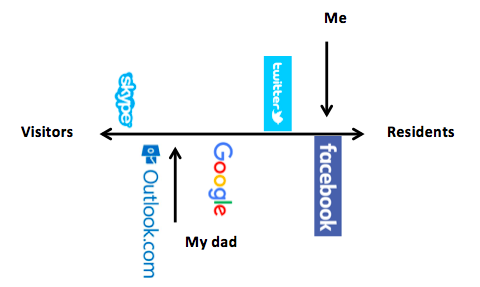As the 21st century was ushered into being with the dawn of the new millennium, the world changed forever. Propelled by elaborate advances in technology and abstemious tales of the newly discovered, this new being quickly morphed into augmented reality where normal social constructs struggled to keep pace and individuals found themselves being divided and defined as either a ‘Digital Native’ or a ‘Digital Immigrant’, terms made famous by Marc Prensky’s 2001 academy article of the same name.
Prensky believed there were two distinct categories people of the newly centralised digital word fitted within: ‘digital natives’ and ‘digital immigrants’. According to Prensky (2001) the term digital native refers to the younger generation that has grown up in the immersive digital environment and because of this possess an ability to use new technology with ease. A far cry from those born before 1980, the older generation Prensky (2001) defined as digital immigrants, those who came of age before the digital immersion and are thus immigrants to the new technology.
Having spent what seems like an eternity trying to get my head around this mindboggling concept I find myself questioning that age is the key determinant of a persons technological skill.
One of my earliest memories as a child was my grandfather teaching me how to use publisher so I could make tickets for my pretend dance show. Which has left me asking myself, if Prensky’s theory is right then why is my grandfather who was born long before the digital immersion so adept at teaching me a so called “digital native” how to use a computer programme I was born within the era of?
Research has allowed me to discover there is in fact very little empirical evidence to support any of Prensky’s claims and there is a growing body of academic research that also questions the validity of Prensky’s interpretation.
Although Prensky’s original article is merely based on his opinion, thus providing no empirical evidence that the young generation engage with different technology to their predecessors, nor any evidence that they learn in different ways, Prensky’s ideas have since gone on to influence a number of policy-makers and researchers. For example on 11th January 2012, Education Secretary Michael Gove announced he was scrapping the existing ICT curriculum, and replacing it with new courses of study in Computer Science (Department for Education, 2012).
Additionally, through my research I came across an article on First Monday, an online technology and sociology journal that offered a new way of interoperating how people participate in the digital world that makes a whole lot more sense to me. The article is called “Visitors and Residents: A new typology for online engagement”, by David White and Alison Le Cornu. They suggest that the old typology did nothing more than provoke a sense of panic among “immigrants” creating a self fulfilling prophecy whereby they deemed themselves “wrong-footed and unable to step up to the plate” (White and Le Cornu, 2011) and consequently provide us with the terms – Visitors and Residents.
Similar to marauders, as outlined in David Canter’s 2003 book Mapping Murder: The Secrets of Geographical Profiling, who maunder into an area to commit crime, a ‘Visitor’ migrates onto the internet to achieve a specific goal (Canter, 2003). Being unlikely to hold any form of online profile; their identity is unknown within the digital world. Wary of creating a Facebook profile, they’ve no qualms however when it comes to using ‘tools’ such as email or Skype as a means of communication. However only when it is necessary to complete their goal or to communicate in a more rapid manner than offline communicative methods would permit.
Contrastingly Residents see the Web as a virtual community. While they use ‘tools’ such as email and Skype Residents unlike Visitors have no qualms in having a ‘digital identity’ and use social networking platforms such as Facebook and Twitter on a regular basis suggesting their residency is an additional layer of interaction to that of a Visitor. Consequently when Residents log off “an aspect of their persona remains” (White and Le Cornu, 2011).
The Visitors and Residents typology allows individuals to place themselves at a particular point along a continuum rather than having to fit within one of two distinct categories (White and Le Cornu, 2011).
Above I have placed my dad and myself along the Visitors and Residents continuum and as you can see we occupy very different ends of the continuum!

Only using the Internet to look at cars and Skype his beloved daughter (me) at university and other members of family around the world; my dad expresses a number of reasons for not wanting to have a Facebook profile (digital identity), with privacy and identity theft being of paramount importance to him.
Like all Visitors he sees the Web as a set of tools that deliver or exchange content anonymously. A view I certainly don’t share.
As an active member of a number of different social networking platforms I find myself spending copious amounts of hours absorbed in the powerful forum that is social media.
Word count: 843
Reference list
Canter, David V. (2003). Mapping Murder: The Secrets of Geographical Profiling. London: Virgin Books.
Department for Education (2012) ‘Harmful’ ICT curriculum set to be dropped to make way for rigorous computer science. Available at: https://www.gov.uk/government/news/harmful-ict-curriculum-set-to-be-dropped-to-make-way-for-rigorous-computer-science (Accessed: 12 March 2014).
Prensky, M. (2001). ‘Digital Natives, Digital Immigrants’, On the Horizon, 9(5) Available at: http://www.marcprensky.com/writing/Prensky%20-%20Digital%20Natives,%20Digital%20Immigrants%20-%20Part1.pdf. (Accessed: 21 March 2016)
White, David, S. and Le Cornu, Alison. (2011). Visitors and Residences: A new topology for online engagement. First Monday, 16(9) Available at: http://firstmonday.org/article/view/3171/3049%20https://comminfo.rutgers.edu/%7Etefko/Courses/Zadar/Readings/Selwyn%20dig%20natives,%20Aslib%20Proceedings%202009.pdf. (Accessed: 21 March 2016)
